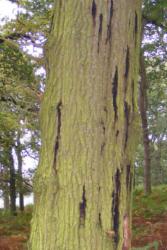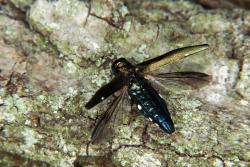Forest Research wins funding for collaborative research into oak tree health
Media release from Forest Research
 The trunk of an oak tree showing the 'bleeding' signs of Acute Oak DeclineA pioneering new project to investigate the health of our British oak trees has been the go-ahead thanks to almost £2 million investment from the Biotechnology and Biological Sciences Research Council (BBSRC), Natural Environment Research Council (NERC), Defra and Scottish Government.
The trunk of an oak tree showing the 'bleeding' signs of Acute Oak DeclineA pioneering new project to investigate the health of our British oak trees has been the go-ahead thanks to almost £2 million investment from the Biotechnology and Biological Sciences Research Council (BBSRC), Natural Environment Research Council (NERC), Defra and Scottish Government.
The project, named ‘BAC-STOP’ (Bacteria: Advancement of Control and Knowledge to Save Threatened Oak and Protect them for Future Generations’), will focus on Acute Oak Decline (AOD) - an emerging complex disease in which bacteria cause stem lesions on native species of British oak.
BAC-STOP aims to produce evidence to inform tree health policy and to develop practical measures for the management of AOD to enhance the resilience of British oak.
The project will involve a multidisciplinary team led by Dr Sandra Denman at Forest Research and includes the University of the West of England, Rothamsted Research, Bangor University (Prof James McDonald, School of Natural Sciences) and Aberystwyth University.
The project builds on previous research conducted by Dr Sandra Denman and her collaborators and addresses research priorities identified by the Action Oak partnership and outlined in the government Tree Health and Resilience Strategy.
Dr Sandra Denman, the project’s Principal Investigator said:
“We are delighted to be awarded this grant to work on bacterial diseases of British oak and other native broadleaved trees.
“Currently our trees face an ever increasing pressure from pest and disease threats and environmental stresses aligned with climate change. Through this project our aim is to help boost the resilience of oak and secure their future in our landscape.”
A The beetle Agrilus biguttatus co-occurs with AOD symptoms.cute oak decline is a combination of factors which cause oak trees to become stressed. Environmental stresses like soil conditions, drought, waterlogging and pollution can all impact the tree.
The beetle Agrilus biguttatus co-occurs with AOD symptoms.cute oak decline is a combination of factors which cause oak trees to become stressed. Environmental stresses like soil conditions, drought, waterlogging and pollution can all impact the tree.
To improve silvicultural management of oak trees for disease prevention and resilience, long term field trials will be carried out to investigate the impacts of these environmental impacts on the susceptibility of oak trees to AOD.
The project will also examine whether the bacteria present in AOD bleeds (dark-coloured vertical fissures) on oak are found in bleeds on other broadleaved trees. This will help researchers to assess the risk of the AOD bacteria to other tree species.
Using cutting-edge science, the project will assess the transmission of bacteria in AOD by studying the behaviour of the beetle Agrilus biguttatus which co-occurs with AOD symptoms. By gaining a better understanding of the beetle’s interactions with AOD bacteria and oak trees, the aim is to resolve the controversy of its role in the spread of AOD and to inform practical management of the disease.
A range of stakeholders will be involved in the research to explore social knowledge, attitudes, and motivations to act on AOD, helping to design realistic options for the management of oak health for future resilience.
Publication date: 8 July 2020
